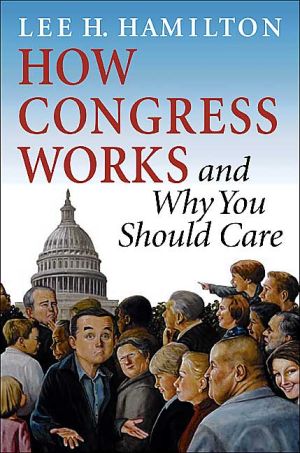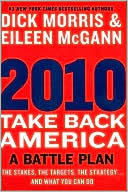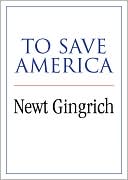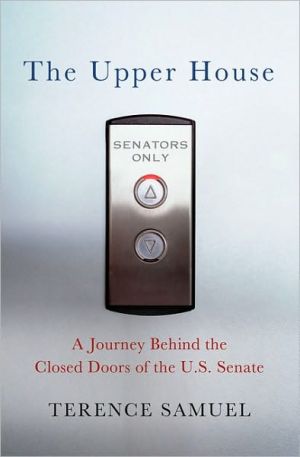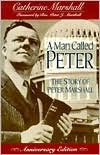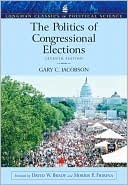How Congress Works: And Why You Should Care
How Congress Works and Why You Should Care is a concise introduction to the functions and vital role of the U.S. Congress by eminent former Congressman Lee H. Hamilton. Drawing on 34 years as a U.S. Representative, Hamilton explains how Congress reflects the diversity of the American people, serves as a forum for finding consensus, and provides balance within the federal government. Addressing widespread public misperceptions, he outlines areas where Congress can work better and ways for...
Search in google:
An inside look at the way Congress works and how it impacts the lives of all Americans, by an eminent former congressman. Part criticism and part vigorous defense of the legislative branch, the book is essential reading for anyone who wants to understand the inner workings of Congress, and how all citizens can participate in its unique mission. Publishers Weekly Remember that "how a bill becomes law" charts in your high school civics class? It doesn't begin to describe the "messy" process that really operates in Congress, according to Hamilton, a former congressman from Indiana who was respected on both sides of the aisle. He offers a strong defense of the institution he served from 1965 to 1999. This basic primer details the history of Congress, its importance and some of the critical actions it has taken-from the Tariff Act of 1790, which established duties on imported goods, to landmark laws of the 1960s, such as the Voting Rights Act and the bills that established Medicare and Medicaid. Hamilton also describes the "complicated and untidy" process by which Congress really works and why we "need more people who know how to practice the art of politics." Congress, he argues, acts "as the people's voice against unchecked power[;] it is the guarantor of liberty." The author is not uncritical of Congress, offering several suggestions as to how that body could improve itself. But here and elsewhere in the book, his suggestions and arguments fail to scratch much below the surface. It's hard to disagree with the statements that congressional discourse should be more civil and that citizens should be more active in politics, but Hamilton fails to address the causes of these and other problems. Still, in a cynical age, and a time of increasing presidential authority, it's encouraging to see a true, reasonable believer call for recognizing Congress as a necessary pillar of American democracy. Parents should send this primer off with their kids to college. (Mar.) Copyright 2004 Reed Business Information.
Preface1The Role of Congress12The Impact of Congress263How Congress Works424Public Criticisms of Congress755Key Ways Congress Could Work Better976Civic Participation124AppCommunicating with Congress149Notes151Index153
\ The Cook Political Report"Lee Hamilton's new book... should be required reading for any American contemplating writing a ‘Letter to the Editor’ or calling into (or hosting) a radio talk show, or for that matter, stepping into a voting booth. It is an owner’s manual for citizens interested in their Congress." —Charlie Cook, Editor and Publisher, The Cook Political Report\ — Charlie Cook, Editor and Publisher\ \ \ \ \ \ SciTech Book News"Americans cannot be faulted for having a deeply jaundiced view of their Congress, says Hamilton (Woodrow Wilson International Center for Scholars); he ought to know, because he served as a Representative for Indiana from 1965 to 1999. But he argues that people can and should fix it rather than give up on it completely." —SciTech Book News, February 2010\ \ \ Publishers WeeklyRemember that "how a bill becomes law" charts in your high school civics class? It doesn't begin to describe the "messy" process that really operates in Congress, according to Hamilton, a former congressman from Indiana who was respected on both sides of the aisle. He offers a strong defense of the institution he served from 1965 to 1999. This basic primer details the history of Congress, its importance and some of the critical actions it has taken-from the Tariff Act of 1790, which established duties on imported goods, to landmark laws of the 1960s, such as the Voting Rights Act and the bills that established Medicare and Medicaid. Hamilton also describes the "complicated and untidy" process by which Congress really works and why we "need more people who know how to practice the art of politics." Congress, he argues, acts "as the people's voice against unchecked power[;] it is the guarantor of liberty." The author is not uncritical of Congress, offering several suggestions as to how that body could improve itself. But here and elsewhere in the book, his suggestions and arguments fail to scratch much below the surface. It's hard to disagree with the statements that congressional discourse should be more civil and that citizens should be more active in politics, but Hamilton fails to address the causes of these and other problems. Still, in a cynical age, and a time of increasing presidential authority, it's encouraging to see a true, reasonable believer call for recognizing Congress as a necessary pillar of American democracy. Parents should send this primer off with their kids to college. (Mar.) Copyright 2004 Reed Business Information.\ \
